About Morse Clinic Of North Raleigh
You can find the Morse Clinic of North Raleigh in the city of Raleigh in North Carolina. They provide opioid use disorder treatment and medication assisted treatment. The program includes individual and group counseling as well as drug screening and referral services.
The clinic takes Medicaid and Original Medicare. They aim to keep treatment affordable and have cash prices that you can pay weekly during the program. The clinic is CARF Accredited.
Outpatient Opioid Treatment in Wake County
The clinic offers traditional medication assisted treatment (MAT) and offers either methadone or buprenorphine. The methadone program is less expensive on a weekly basis, and once you get started, getting your dose takes only a few minutes each day.
Individual counseling sessions give you one on one support that helps you with creating healthy coping mechanisms, setting short term and long term goals, handling ups and downs during treatment and setting up strategies to avoid relapse in tempting situations. You meet with your individual therapist at least once a month during your first year of treatment.
Group counseling helps you feel less alone as you connect with others going through the same challenges as you. There are multiple groups, including one for people new to MAT, a group about recovery strategies, a relapse prevention groups and one for pregnant women and new mothers.
Earning Additional Privileges During Treatment
I noticed that they have additional benefits you can earn as you progress through treatment. In particular, being able to take home some of your doses is a big deal that increases the convenience of treatment.
However, you have to reach a certain level so they trust that you will use the medication appropriately. Your counselor can give you a list of criteria required to be reviewed for this arrangement, and the decision is made by the Medical Director.
Latest Reviews
Our team is committed to providing care in a safe and respectful environment for both our patients and the surrounding community. While we do not control external infrastructure such as street lighting or traffic flow, we regularly communicate with local authorities and property management to address issues that may impact safety.
We understand that early-morning traffic and limited visibility can be challenging, and we will continue to advocate for improvements in these areas. If you have specific suggestions or observations, we welcome you to reach out directly — community input is vital to helping us serve everyone better.
We have had 0 accidents since opening in 2016. Stigma kills more than accidents for sure.
Thank you again for taking the time to voice your concerns.
The Morse Clinic of North Raleigh Team
Rehab Score
Gallery
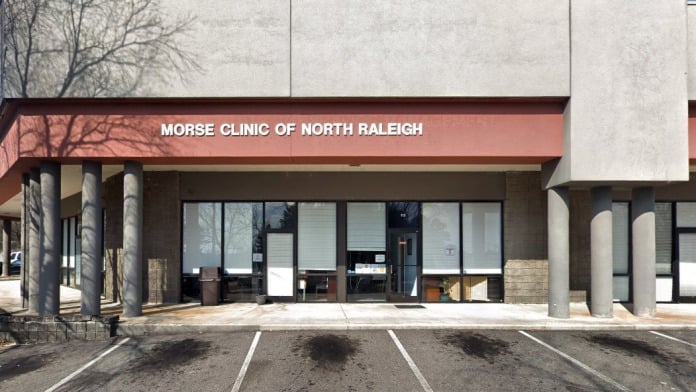
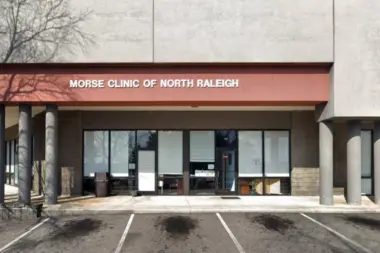
Accepted Insurance
Other Forms of Payment
Private insurance refers to any kind of healthcare coverage that isn't from the state or federal government. This includes individual and family plans offered by an employer or purchased from the Insurance Marketplace. Every plan will have different requirements and out of pocket costs so be sure to get the full details before you start treatment.
Self-pay involves paying for treatment out of your own pocket. You can use savings or credit, get a personal loan, or receive help from family and friends to fund your treatment. If you don't have insurance or your insurance plan doesn't cover a specific program, self-pay can help ensure you still get the care you need.
Medicare is a federal program that provides health insurance for those 65 and older. It also serves people under 65 with chronic and disabling health challenges. To use Medicare for addiction treatment you need to find a program that accepts Medicare and is in network with your plan. Out of pocket costs and preauthorization requirements vary, so always check with your provider.
Medicaid is a state based program that helps lower-income individuals and families pay for healthcare. Medicaid covers addiction treatment so those enrolled can use their coverage to pay for rehab. When a program accepts Medicaid the client often pays very little or nothing out of their own pocket.
Addiction Treatments
Levels of Care
A medically assisted detox is the safest way to remove addictive drugs and alcohol from your body. A team of licensed medical professionals will look after you 24/7 to monitor your health, help minimize discomfort, and provide medications if necessary to alleviate any withdrawal symptoms. This process is typically the first step in your recovery and may take around 5-7 days, although length will depend on your individual needs.
Treatments
A combined mental health and substance abuse rehab has the staff and resources available to handle individuals with both mental health and substance abuse issues. It can be challenging to determine where a specific symptom stems from (a mental health issue or an issue related to substance abuse), so mental health and substance abuse professionals are helpful in detangling symptoms and keeping treatment on track.
Opioid rehabs specialize in supporting those recovering from opioid addiction. They treat those suffering from addiction to illegal opioids like heroin, as well as prescription drugs like oxycodone. These centers typically combine both physical as well as mental and emotional support to help stop addiction. Physical support often includes medical detox and subsequent medical support (including medication), and mental support includes in-depth therapy to address the underlying causes of addiction.
Programs
Adult rehab programs include therapies tailored to each client's specific needs, goals, and recovery progress. They are tailored to the specific challenges adult clients may face, including family and work pressures and commitments. From inpatient and residential treatment to various levels of outpatient services, there are many options available. Some facilities also help adults work through co-occurring conditions, like anxiety, that can accompany addiction.
Young adulthood can be an exciting, yet difficult, time of transition. Individuals in their late teens to mid-20s face unique stressors related to school, jobs, families, and social circles, which can lead to a rise in substance use. Rehab centers with dedicated young adult programs will include activities and amenities that cater to this age group, with an emphasis on specialized counseling, peer socialization, and ongoing aftercare.
Clinical Services
Group therapy is any therapeutic work that happens in a group (not one-on-one). There are a number of different group therapy modalities, including support groups, experiential therapy, psycho-education, and more. Group therapy involves treatment as well as processing interaction between group members.
In individual therapy, a patient meets one-on-one with a trained psychologist or counselor. Therapy is a pivotal part of effective substance abuse treatment, as it often covers root causes of addiction, including challenges faced by the patient in their social, family, and work/school life.
Staff & Accreditations
Staff
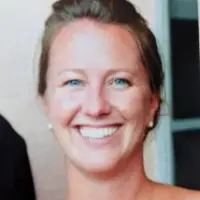
Michelle Kornegay
CEO
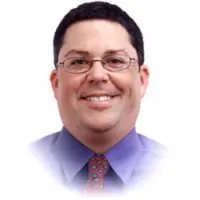
Dr. Eric Morse
Founder, President & CMO
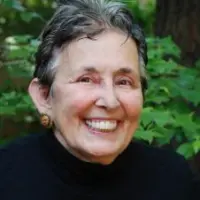
Billie Alexander Avery, LCAS, CCS
Program Director
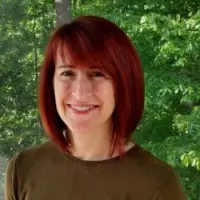
Dr. Heidi Green, MD
Medical Director
Accreditations

The Commission on Accreditation of Rehabilitation Facilities (CARF) is a non-profit organization that specifically accredits rehab organizations. Founded in 1966, CARF's, mission is to help service providers like rehab facilities maintain high standards of care.
CARF Accreditation: Yes
Accreditation Number: 273570
Contact Information
3209 Gresham Lake Rd #113
Raleigh, NC 27615
